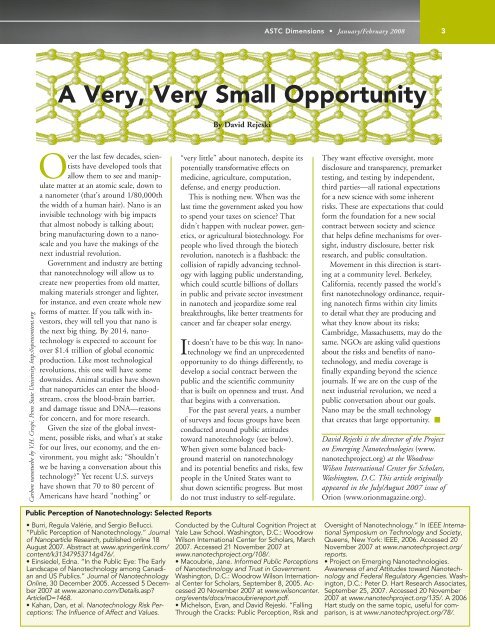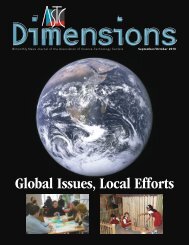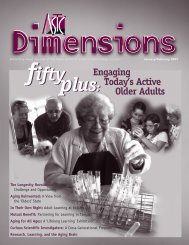Scientists Speak about Nano - Association of Science - Technology ...
Scientists Speak about Nano - Association of Science - Technology ...
Scientists Speak about Nano - Association of Science - Technology ...
You also want an ePaper? Increase the reach of your titles
YUMPU automatically turns print PDFs into web optimized ePapers that Google loves.
Carbon nanotuebe by V.H. Crespi, Penn State University, http://opencontent.org<br />
By David Rejeski<br />
ASTC Dimensions • January/February 2008 3<br />
A Very, Very Small Opportunity<br />
Over the last few decades, scientists<br />
have developed tools that<br />
allow them to see and manipulate<br />
matter at an atomic scale, down to<br />
a nanometer (that’s around 1/80,000th<br />
the width <strong>of</strong> a human hair). <strong>Nano</strong> is an<br />
invisible technology with big impacts<br />
that almost nobody is talking <strong>about</strong>;<br />
bring manufacturing down to a nanoscale<br />
and you have the makings <strong>of</strong> the<br />
next industrial revolution.<br />
Government and industry are betting<br />
that nanotechnology will allow us to<br />
create new properties from old matter,<br />
making materials stronger and lighter,<br />
for instance, and even create whole new<br />
forms <strong>of</strong> matter. If you talk with investors,<br />
they will tell you that nano is<br />
the next big thing. By 2014, nanotechnology<br />
is expected to account for<br />
over $1.4 trillion <strong>of</strong> global economic<br />
production. Like most technological<br />
revolutions, this one will have some<br />
downsides. Animal studies have shown<br />
that nanoparticles can enter the bloodstream,<br />
cross the blood-brain barrier,<br />
and damage tissue and DNA—reasons<br />
for concern, and for more research.<br />
Given the size <strong>of</strong> the global investment,<br />
possible risks, and what’s at stake<br />
for our lives, our economy, and the environment,<br />
you might ask: “Shouldn't<br />
we be having a conversation <strong>about</strong> this<br />
technology?” Yet recent U.S. surveys<br />
have shown that 70 to 80 percent <strong>of</strong><br />
Americans have heard “nothing” or<br />
Public Perception <strong>of</strong> <strong>Nano</strong>technology: Selected Reports<br />
• Burri, Regula Valérie, and Sergio Bellucci.<br />
“Public Perception <strong>of</strong> <strong>Nano</strong>technology.” Journal<br />
<strong>of</strong> <strong>Nano</strong>particle Research, published online 18<br />
August 2007. Abstract at www.springerlink.com/<br />
content/k31347953714g476/.<br />
• Einsiedel, Edna. “In the Public Eye: The Early<br />
Landscape <strong>of</strong> <strong>Nano</strong>technology among Canadian<br />
and US Publics.” Journal <strong>of</strong> <strong>Nano</strong>technology<br />
Online, 30 December 2005. Accessed 5 December<br />
2007 at www.azonano.com/Details.asp?<br />
ArticleID=1468.<br />
• Kahan, Dan, et al. <strong>Nano</strong>technology Risk Perceptions:<br />
The Influence <strong>of</strong> Affect and Values.<br />
“very little” <strong>about</strong> nanotech, despite its<br />
potentially transformative effects on<br />
medicine, agriculture, computation,<br />
defense, and energy production.<br />
This is nothing new. When was the<br />
last time the government asked you how<br />
to spend your taxes on science? That<br />
didn’t happen with nuclear power, genetics,<br />
or agricultural biotechnology. For<br />
people who lived through the biotech<br />
revolution, nanotech is a flashback: the<br />
collision <strong>of</strong> rapidly advancing technology<br />
with lagging public understanding,<br />
which could scuttle billions <strong>of</strong> dollars<br />
in public and private sector investment<br />
in nanotech and jeopardize some real<br />
breakthroughs, like better treatments for<br />
cancer and far cheaper solar energy.<br />
It doesn’t have to be this way. In nanotechnology<br />
we find an unprecedented<br />
opportunity to do things differently, to<br />
develop a social contract between the<br />
public and the scientific community<br />
that is built on openness and trust. And<br />
that begins with a conversation.<br />
For the past several years, a number<br />
<strong>of</strong> surveys and focus groups have been<br />
conducted around public attitudes<br />
toward nanotechnology (see below).<br />
When given some balanced background<br />
material on nanotechnology<br />
and its potential benefits and risks, few<br />
people in the United States want to<br />
shut down scientific progress. But most<br />
do not trust industry to self-regulate.<br />
Conducted by the Cultural Cognition Project at<br />
Yale Law School. Washington, D.C.: Woodrow<br />
Wilson International Center for Scholars, March<br />
2007. Accessed 21 November 2007 at<br />
www.nanotechproject.org/108/.<br />
• Macoubrie, Jane. Informed Public Perceptions<br />
<strong>of</strong> <strong>Nano</strong>technology and Trust in Government.<br />
Washington, D.C.: Woodrow Wilson International<br />
Center for Scholars, September 8, 2005. Accessed<br />
20 November 2007 at www.wilsoncenter.<br />
org/events/docs/macoubriereport.pdf.<br />
• Michelson, Evan, and David Rejeski. “Falling<br />
Through the Cracks: Public Perception, Risk and<br />
They want effective oversight, more<br />
disclosure and transparency, premarket<br />
testing, and testing by independent,<br />
third parties—all rational expectations<br />
for a new science with some inherent<br />
risks. These are expectations that could<br />
form the foundation for a new social<br />
contract between society and science<br />
that helps define mechanisms for oversight,<br />
industry disclosure, better risk<br />
research, and public consultation.<br />
Movement in this direction is starting<br />
at a community level. Berkeley,<br />
California, recently passed the world’s<br />
first nanotechnology ordinance, requiring<br />
nanotech firms within city limits<br />
to detail what they are producing and<br />
what they know <strong>about</strong> its risks;<br />
Cambridge, Massachusetts, may do the<br />
same. NGOs are asking valid questions<br />
<strong>about</strong> the risks and benefits <strong>of</strong> nanotechnology,<br />
and media coverage is<br />
finally expanding beyond the science<br />
journals. If we are on the cusp <strong>of</strong> the<br />
next industrial revolution, we need a<br />
public conversation <strong>about</strong> our goals.<br />
<strong>Nano</strong> may be the small technology<br />
that creates that large opportunity. ■<br />
David Rejeski is the director <strong>of</strong> the Project<br />
on Emerging <strong>Nano</strong>technologies (www.<br />
nanotechproject.org) at the Woodrow<br />
Wilson International Center for Scholars,<br />
Washington, D.C. This article originally<br />
appeared in the July/August 2007 issue <strong>of</strong><br />
Orion (www.orionmagazine.org).<br />
Oversight <strong>of</strong> <strong>Nano</strong>technology.” In IEEE International<br />
Symposium on <strong>Technology</strong> and Society,<br />
Queens, New York: IEEE, 2006. Accessed 20<br />
November 2007 at www.nanotechproject.org/<br />
reports.<br />
• Project on Emerging <strong>Nano</strong>technologies.<br />
Awareness <strong>of</strong> and Attitudes toward <strong>Nano</strong>technology<br />
and Federal Regulatory Agencies. Washington,<br />
D.C.: Peter D. Hart Research Associates,<br />
September 25, 2007. Accessed 20 November<br />
2007 at www.nanotechproject.org/135/. A 2006<br />
Hart study on the same topic, useful for comparison,<br />
is at www.nanotechproject.org/78/.





